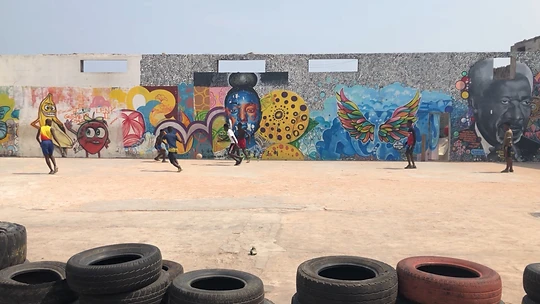I traveled with a group of three friends to Ghana to support a local NGO providing healthcare services to rural communities. This trip was an amazing source of inspiration. Among several learnings, I distilled some key learnings that entrepreneurs can find useful.
Reality Strikes You
When we first started working with our NGO from across seas, we received a broad target of our project and some initial data. We scheduled some calls to learn context and request additional data — in three calls we developed a few initial hypotheses on how we could solve the problem before traveling to Ghana.
Before we arrived in Ghana, we had looked up the distance between neighboring villages and, given that we had seen roads connecting them on Google Maps, we believed that transfers between villages should take no more than 5’. Yet, it took us at least 20’ to travel between villages — the road network in rural Ghana lacks basic infrastructure and can be impacted even by minor rain.

This happens frequently in the customer discovery process for entrepreneurs. Startups start interviewing potential clients and experts to collect as much info and data as possible before launching a product. And then, once the product is ready, the actual sales are much lower compared to the projected growth. Skilled entrepreneurs collect enough data and generate meaningful insights from the customer discovery process. But many times, successful entrepreneurs need subject-matter expertise to convert projections to actual sales, even if the product is a pain-killer in theory.
As an entrepreneur, it is not a pre-requisite to have experience in the industry you are targeting; but if you don’t, make sure you on-board a team of advisors who do!
What Makes People Smile?

Ghana lives and breathes football (I refer to the sport played without hands, only feet, thus football). It’s surprising how massive the impact of British football is in the country. Most people wear jerseys of their favorite teams (not surprisingly, traditional brands like Manchester United, Liverpool, Arsenal, and Chelsea dominate). There’s a small, custom football field on every street corner, with myriad football players in it. Football there is as inclusive as it gets: kids between 10- and 15-years-old play together in the same pitch.
Football is unique in Ghana because it unites people. In most developed countries, football is still loved as a religion, but it’s also a source of rage and criminal activity: armies of hooligans vandalizing cities and shady actors making millions in illegal betting. Yet, in Ghana, football is a religion that promotes inclusion and does not tolerate violence. Football is the source of an unprecedented smile rate and a key source of socializing and having fun.

When building your startup, you need to find your team’s “football,” something that inspires your employees to achieve your vision and improve their work lives.
At foodpanda, we had a team that was >80 percent international. We all enjoyed the multi-culti environment in Berlin and we felt proud that foodpanda had business in over 40 countries worldwide. Our diversity united us! That’s why we had so much fun playing our weekly trivia game with questions from all over the world and participating in (very intimidating) themed karaoke nights.
Sanne Manders, COO of flexport, has helped the company build a very strong culture of collaboration and motivation by introducing a cross-functional organizational structure called “squad.” Horizontal squads bring together people from sales, product and operations, and vertical squads bring together people from flexport’s customer segments: small, medium, and larger clients. This sophisticated organizational structure allows squads to have their own (ridiculous) names and outfits and compete in internal fantasy leagues. They make fun of other teams by creating custom slack emojis and enjoy team dinners.
This squad structure has helped flexport make sure that information is diffused among teams and customer segments, which is a huge challenge in startups that are expanding at the rate of flexport. In the flexport world, sales and product people are friends because the culture (and org structure) give them the opportunity to feel part of the same family.
Key Takeaway: Stay Positive!
People in Ghana live in conditions that Westerners would find challenging, yet, they manage to live joyfully. Their mentality towards life and the challenges that face them is truly unique — and we all need to learn from them! If you get the chance, try to visit Ghana and learn from locals and their amazing culture, I promise the trip will be a life-changing experience.
– Agapitos Diakogiannis ’20
